5 Worst Salad Dressings for High Cholesterol
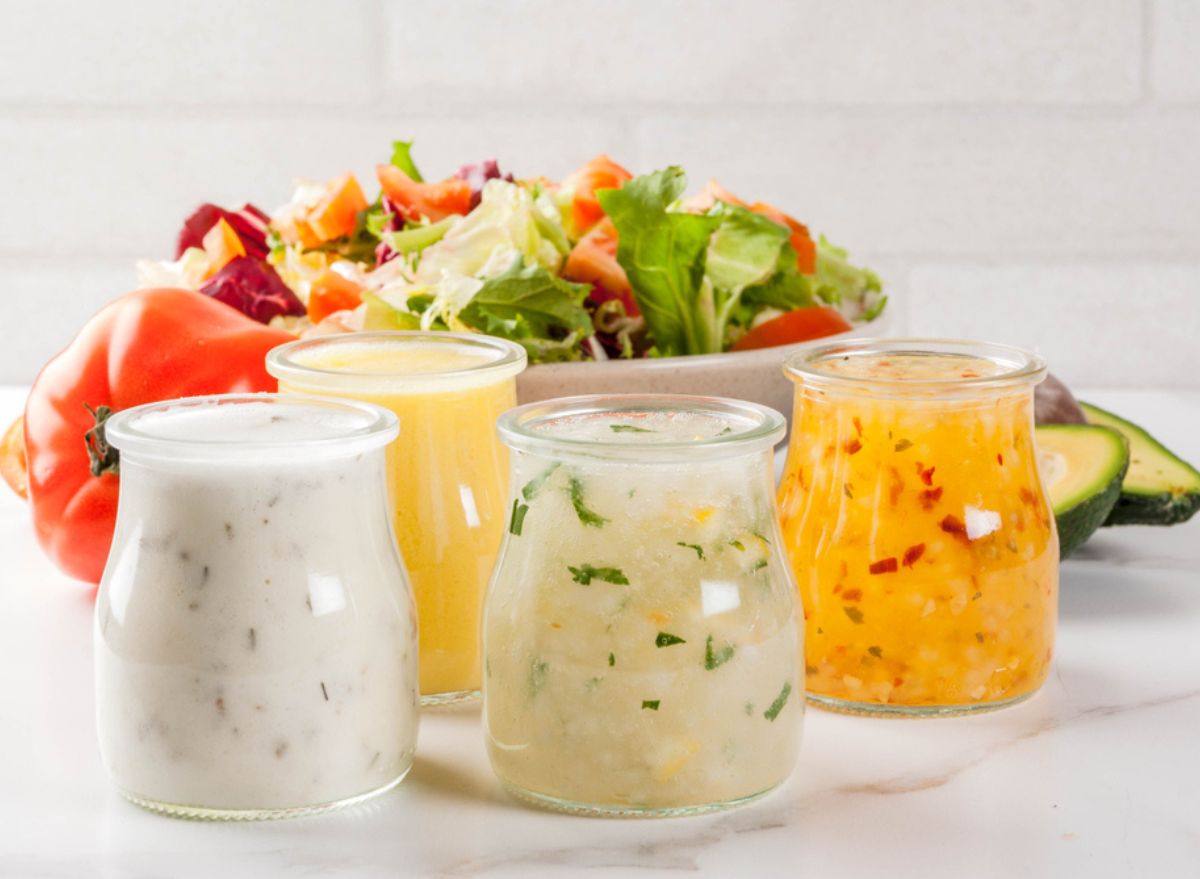
When your cholesterol starts creeping up, your doctor will likely suggest diet changes as the first line of defense. A diet full of red meat, full-fat dairy, pastries, processed foods, and other foods high in saturated fat and added sugars increases the risk for high cholesterol levels and heart disease, while more whole foods like fruits, vegetables, beans, heart-healthy oils, and whole grains can help lower it.
While replacing a few burgers and milkshakes a week with salad and water is a great way to add more vegetables, fiber, and other important nutrients to your diet while cutting down on saturated fat and refined carbohydrates, there could be a sneaky salad ingredient keeping you from meeting your goals. What you put on your salad could actually make it a not-so-healthy choice for your cholesterol and heart health.
One of the biggest culprits for making a salad less healthy is the dressing you put on it. While adding dressing won't take away from the nutrition and health benefits you'll get from leafy greens and other vegetables on your salad, it can add unhealthy sugars, fat, and excess calories.
So, what makes a salad dressing bad for your cholesterol? The saturated fat and added sugars in dressing can add up quickly and keep you from reaching your cholesterol goals, especially if you use more than just a tablespoon or two. Here are five of the worst salad dressings for cholesterol. Remember that not all brands or types of these dressings contain the same ingredients, so be sure to read your labels! Read on, and for more, don't miss The Most Crucial Eating Habit for High Cholesterol.
Honey Mustard Dressing
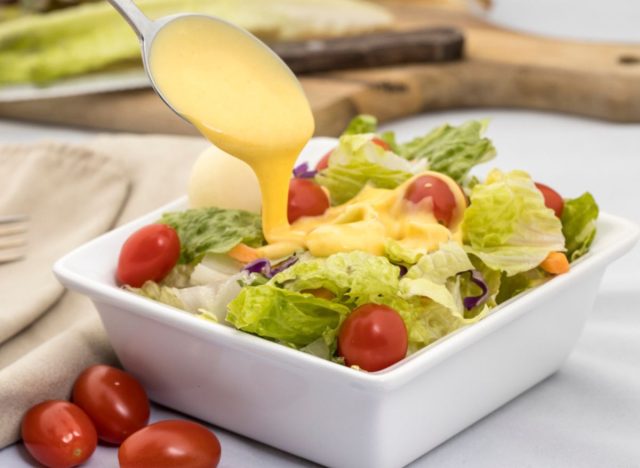
Honey mustard is sweet, tangy, and admittedly delicious but can be a massive sugar trap for your otherwise healthy salad. While not all honey mustard dressings have excessive sugar, some pack a lot in a small serving.
"Maple Grove Farms Fat-free Honey Dijon Mustard dressing is one of the worst offenders, providing 9 grams of added sugar per 2-tablespoon serving," says Sharon Puello, MA, RD, CDN, CDCES. "For heart health, it's recommended to limit intake to less than 25 grams of added sugar per day, as sugar can significantly affect triglycerides."
Too many added sugars and rising triglyceride levels can spell bad news for your arteries. High triglycerides can increase the hardening and thickening of the artery walls, increasing the chance for a potential blockage. Because of this, triglycerides are often monitored along with total cholesterol, LDL-cholesterol, and HDL-cholesterol levels. Try limiting added sugars in your salad dressing to less than 3 grams per serving and watching your portion size.
Ranch Dressing
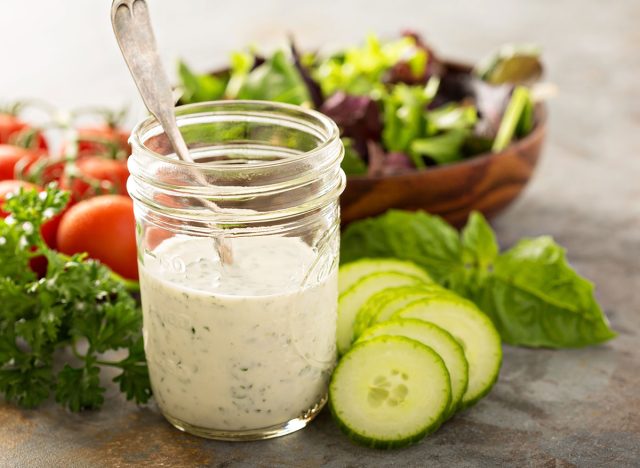
Ranch dressing isn't reserved for just salads. It's a condiment that goes with pizza, chicken, carrot sticks, and every food in between. But, when it comes to salad, the fat in this dressing can quickly add up. "A 2-tablespoon serving of ranch dressing (such as Hidden Valley Original Ranch Salad Dressing) adds 14 grams of fat to that beautiful green salad, 2 of which are saturated," says Lisa Andrews, MEd, RD, LD, registered dietitian and owner of Sound Bites Nutrition.
Excess saturated fat is associated with increased cholesterol levels, particularly LDL-cholesterol (the bad kind). The American Heart Association recommends eating no more than 5-6% of your daily calories from saturated fats for a heart-healthy diet. For a 2,000-calorie diet, this means no more than 13 grams of saturated fat per day.
She recommends going for a vinaigrette instead. An oil-based dressing, especially one higher in heart-healthy oils like olive, canola, corn, or sunflower, has more unsaturated fats with beneficial effects on heart health. Unsaturated fats can improve cholesterol levels when eaten in moderation.
Poppyseed Dressing
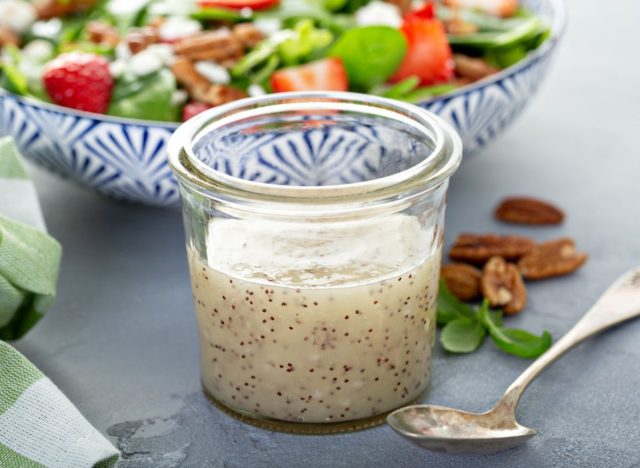
Poppyseed dressing is perfect for salads that are topped with berries, apples, or other fruits. However, the creamy sweetness of this dressing packs a significant amount of added sugar into a small portion.
Just two tablespoons of Kraft Creamy Poppyseed Dressing has 8 grams of added sugar. That's over 30% of your total recommended added sugar in just one serving of dressing! Added sugar can wreak havoc on your cholesterol. Too much added sugar can lower HDL cholesterol (the good kind) and raise your triglycerides.
Blue Cheese Dressing
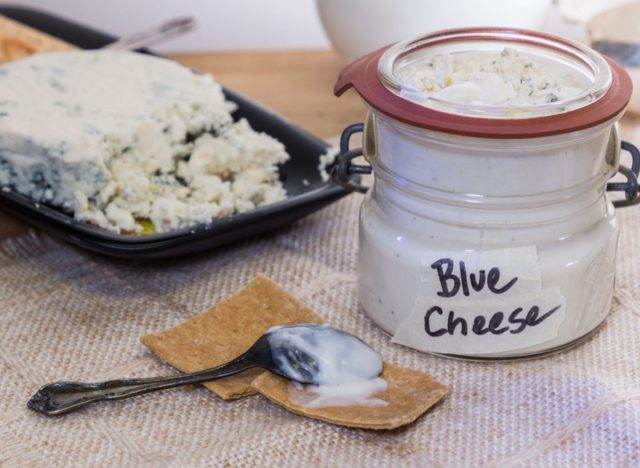
Tangy, pungent, and creamy, blue cheese dressing is a favorite for many. But, the strong taste and creamy texture comes from some not-so-healthy ingredients.
"Blue cheese dressing, like Wish-Bone Chunky Blue Cheese Dressing, contains blue cheese, milk, and possibly mayonnaise, milk, sour cream or yogurt plus oil," says Melissa Altman-Traub MS, RDN, LDN. These dairy ingredients add up to 14 to 18 grams of total fat and 2 to 4 grams of saturated fat per 2-tablespoon serving, Altman-Traub explains.
For a healthier blue cheese dressing, choose one that's yogurt-based. Bolthouse Farms blue cheese dressing has only 4 grams of fat and 1.5 grams of saturated fat per serving, making it a much healthier but still creamy and delicious choice.
Caesar Dressing
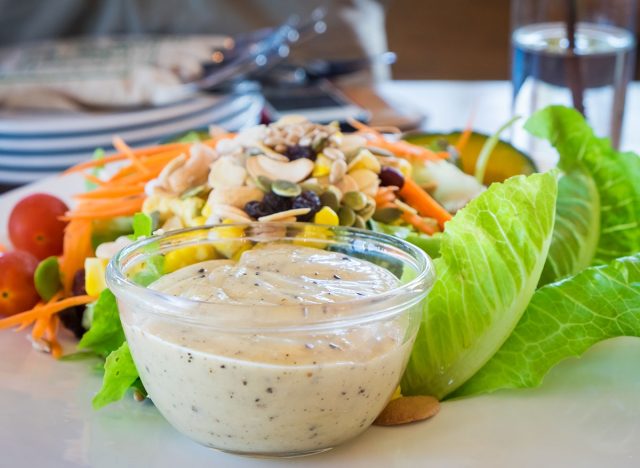
Traditionally, Caesar dressing, such as Ken's Foods Creamy Caesar Salad Dressing, can have 18 grams of fat and 3 grams of saturated fat per two-tablespoon serving from ingredients like egg yolks and sour cream.
Eat This! Instead: Marzetti Simply Dressed Caesar Dressing and Primal Kitchen Caesar Dressing are two full-flavor options with less saturated fat than traditional Caesar dressings. Separately, cutting down on saturated fat from full-fat dairy by swapping with skim dairy helps make this dressing more cholesterol-friendly.









